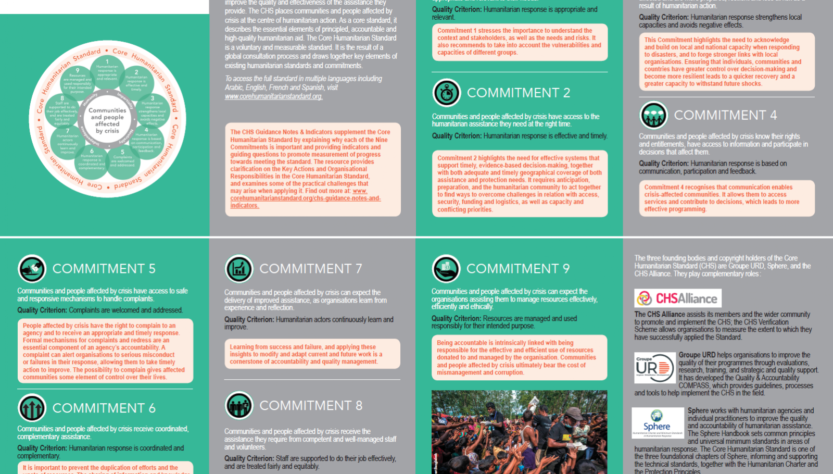The Core Humanitarian Standards (CHS) is a set of principles and guidelines developed by the humanitarian sector to ensure that humanitarian assistance is provided consistently, accountable, and effectively. The CHS was developed by the Sphere Project, a collaboration of humanitarian agencies and experts, and was launched in 2014. The CHS is based on the belief that people affected by crises have the right to life with dignity and receive assistance tailored to their needs.
The CHS consists of nine standards that cover critical aspects of humanitarian assistance, including accountability, coordination, communication, community participation, assessment, design, monitoring, and evaluation. The standards are designed to apply to all types of humanitarian assistance, including emergency response, disaster risk reduction, and long-term development.
The first standard of the CHS is “Humanitarian Response is Accountable to Affected Populations.” This standard emphasizes the importance of involving affected populations in designing, implementing, and evaluating humanitarian programs. It also highlights the need for transparency and accountability in the delivery of assistance.
The second standard is “Coordination and Collaboration.” This standard stresses the importance of coordination between different humanitarian actors, including government agencies, non-governmental organizations, and community-based organizations. This standard recognizes that coordination is essential to ensure that assistance is delivered promptly and effectively.
The third standard is “Humanitarian Response is Impartial and Non-Discriminatory.” This standard emphasizes the need for humanitarian assistance without discrimination based on race, ethnicity, gender, religion, or other factors. It also highlights the need for help to be provided based on need rather than political or other considerations.
The fourth standard is “Humanitarian Response is Based on Communication, Participation, and Feedback.” This standard emphasizes the importance of communication with affected populations, including providing information about assistance and seeking feedback on the effectiveness of programs.
The fifth standard is “Humanitarian Response is Effective and Timely.” This standard stresses the need for assistance to be provided promptly and effectively based on the needs of affected populations.
The sixth standard is “Humanitarian Response Prioritizes the Most Vulnerable and Marginalized.” This standard emphasizes the importance of identifying and prioritizing the needs of the most vulnerable and marginalized populations, including children, women, and persons with disabilities.
The seventh standard is “Humanitarian Response is Based on Continuous Learning and Improvement.” This standard stresses the importance of continuous learning and improvement in humanitarian assistance to ensure that programs are effective and responsive to the needs of affected populations.
The eighth standard is “Humanitarian Response is Safe and Dignified.” This standard emphasizes the importance of ensuring that humanitarian assistance is provided in a safe and dignified manner, including protection from harm and exploitation.
The final standard is “Humanitarian Response is Context Specific and Sustainable.” This standard stresses the importance of tailoring humanitarian assistance to the specific context of each crisis and ensuring that aid is sustainable over the long term.
The Core Humanitarian Standards are a set of principles and guidelines that provide a framework for humanitarian assistance that is consistent, accountable, and effective. The standards cover critical aspects of humanitarian aid, including accountability, coordination, communication, community participation, assessment, design, monitoring, and evaluation. The CHS is an essential tool for ensuring that humanitarian assistance is provided in a manner that respects the dignity and rights of affected populations and effectively meets their needs.


